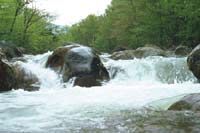|
Several members of the Grinning Planet team all seem to have had the same summer job long ago: Pool Water Splashability Tester. Such abundance of the wonderful wet stuff sometimes makes it easy to take water for granted. But upon reflection, it's clear that we are very reliant on water for the many routines of our daily lives—from showering and brushing teeth, to washing hands and preparing food, to rinsing dishes and washing clothes.
Imagine how much more difficult life would be if the supply of fresh water coming to our homes could not be trusted as clean and safe, or was severely restricted. (Remember the classic movie "Dune," where water was so scarce that they had to wear special suits to recycle their perspiration? Eww!) Many areas of the world are already experiencing water shortages, and many people—including some in the US—are not serviced by clean sources of water.
Some US politicians are fond of pointing out that our waters are cleaner than they have been in 30 years, implying that there is no need to make them cleaner or saying that our waters are pure enough relative to the
 cost of making them even cleaner. The number of waterways in the US categorized as unsafe has indeed declined significantly in the last three decades and we no longer have any rivers that are on fire. This is largely thanks to implementation of the Clean Water Act, which was put into law in the 1970s. The act called for "zero discharge of pollutants into navigable waters by 1985, and fishable and swimmable waters by 1983." However, almost all surface waters still suffer some level of pollution, discharges are still permitted, and the EPA still categorizes roughly 40% of lakes, rivers, and streams as unsafe for fishing or swimming. Many groundwater supplies are also contaminated, and every year there are thousands of beach closings due to pollution.
cost of making them even cleaner. The number of waterways in the US categorized as unsafe has indeed declined significantly in the last three decades and we no longer have any rivers that are on fire. This is largely thanks to implementation of the Clean Water Act, which was put into law in the 1970s. The act called for "zero discharge of pollutants into navigable waters by 1985, and fishable and swimmable waters by 1983." However, almost all surface waters still suffer some level of pollution, discharges are still permitted, and the EPA still categorizes roughly 40% of lakes, rivers, and streams as unsafe for fishing or swimming. Many groundwater supplies are also contaminated, and every year there are thousands of beach closings due to pollution.
This doesn't sound like a situation that warrants the position "we've done enough." The political spin-meisters are simply wrong on this issue—there is still much to do!
Water, not oil, will undoubtedly be the number one resource issue of the 21st century. Making sure we don't pollute our precious fresh water supply is Step One in averting serious water problems in the future. Let's avoid a water Waterloo!
|


